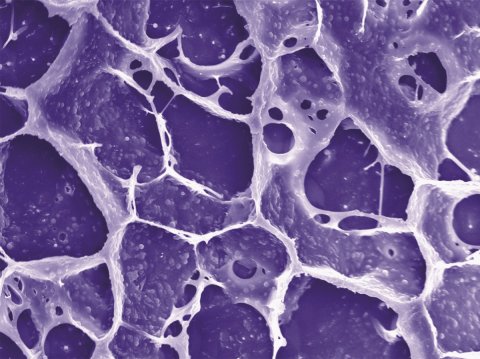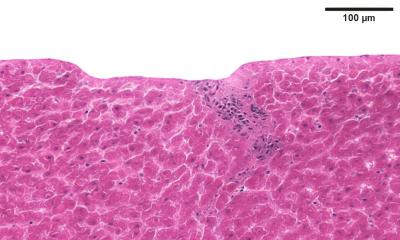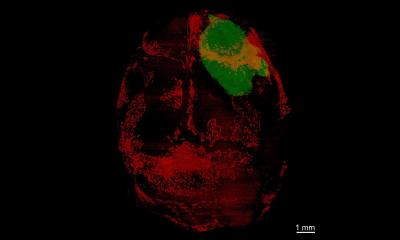News • Immune-boosting substance
This gel could help the body after cancer surgery
Many people who are diagnosed with cancer will undergo some type of surgery to treat their disease — almost 95 percent of people with early-diagnosed breast cancer will require surgery and it’s often the first line of treatment for people with brain tumors, for example. But despite improvements in surgical techniques over the past decade, the cancer often comes back after the procedure.
Credit: Zhen Gu lab
Now, a UCLA-led research team has developed a spray gel embedded with immune-boosting drugs that could help. In a peer-reviewed study, the substance was successful half of the time in awakening lab animals’ immune systems to stop the cancer from recurring and inhibit it from spreading to other parts of the body. A paper describing the work was published in the journal Nature Nanotechnology.
This sprayable gel shows promise against one of the greatest obstacles in curing cancer
Zhen Gu
The researchers, led by Zhen Gu, a professor of bioengineering at the UCLA Samueli School of Engineering and member of the Jonsson Comprehensive Cancer Center, tested the biodegradable spray gel in mice that had advanced melanoma tumors surgically removed. They found that the gel reduced the growth of the tumor cells that remained after surgery, which helped prevent recurrences of the cancer: After receiving the treatment, 50 percent of the mice survived for at least 60 days without their tumors regrowing. The spray not only inhibited the recurrence of tumors from the area on the body where it was removed, but it also controlled the development of tumors in other parts of the body, said Gu, who is also a member of the California NanoSystems Institute at UCLA.
The substance will have to go through further testing and approvals before it could be used in humans. But Gu said that the scientists envision the gel being applied to the tumor resection site by surgeons immediately after the tumor is removed during surgery. “This sprayable gel shows promise against one of the greatest obstacles in curing cancer,” Gu said. “One of the trademarks of cancers is that it spreads. In fact, around 90 percent of people with cancerous tumors end up dying because of tumor recurrence or metastasis. Being able to develop something that helps lower this risk for this to occur and has low toxicity is especially gratifying.”

The researchers loaded nanoparticles with an antibody specifically targeted to block CD47, a protein that cancer cells release as a “don’t-eat-me” signal. By blocking CD47, the antibody enables the immune system to find and ultimately destroy the cancer cells. The nanoparticles are made of calcium carbonate, a substance that is the main component of egg shells and is often found in rocks. Researchers chose calcium carbonate because it can be gradually dissolved in surgical wound sites, which are slightly acidic, and because it boosts the activity of a type of macrophage that helps rid the body of foreign objects, said Qian Chen, the study’s lead author and a postdoctoral researcher in Gu’s lab. “We also learned that the gel could activate T cells in the immune system to get them to work together as another line of attack against lingering cancer cells,” Chen said.
Once the solution is sprayed on the surgical site, it quickly forms a gel embedded with the nanoparticles. The gel helps stop at the surgical site and promotes would healing; the nanoparticles gradually dissolve and release the anti-CD47 antibodies into the body. The researchers will continue testing the approach in animals to learn the optimal dose, best mix of nanoparticles and ideal treatment frequency, before testing the gel on human patients.
Source: University of California, Los Angeles (UCLA), Health Sciences
11.12.2018





